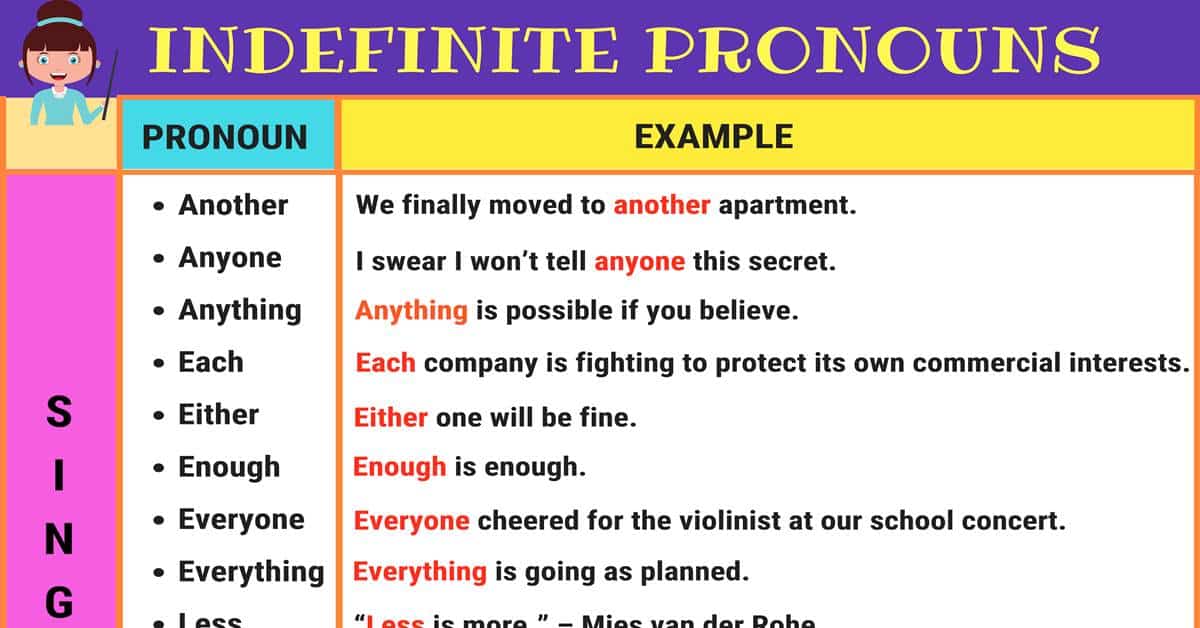Indefinite Pronouns! What is an indefinite pronoun? When we are talking about the indefinite pronoun, we are referring to a word which is used to talk about something which is not specific, for example everyone, nothing or somebody. These are words which are very frequently used within in the English language and of course, come with their own set of grammar rules.
In this section, we are going to provide you with all the information you will need to fully understand the indefinite pronoun and become more confident when using them in a sentence.
What is an Indefinite Pronoun?
An indefinite pronoun is a pronoun that refers to non-specific beings, objects, or places. Indefinite Pronouns can also function as other parts of speech too, depending on context.
Most indefinite pronouns are either singular or plural. However, some of them can be singular in one context and plural in another. For examples:
Singular Indefinite Pronouns List
Another, anybody, anyone, anything, each, either, enough, everybody, everyone, everything, little, much, neither, nobody, no one, nothing, one, other, somebody, someone, something
Plural Indefinite Pronouns List
Both, few, fewer, many, others, several
Both Singular and Plural
All, any, more, most, none, some, such.
Indefinite Pronouns Examples
Learn a useful list of Indefinite Pronouns (singular and plural indefinite pronouns) with example sentences and ESL printable worksheets.
The most commonly used indefinite pronouns are listed below, with examples, as singular, plural or singular/plural.
Singular Indefinite Pronouns Examples
Another
Example:
We finally moved to another apartment.
Anybody/Anyone
Examples:
Has anybody seen my pen?
I swear I won’t tell anyone this secret.
Anything
Example:
Anything is possible if you believe.
Each
Example:
Each company is fighting to protect its own commercial interests.
Either
Example:
Either one will be fine.
Enough
Example:
Enough is enough.
Everybody/Everyone
Example:
Everyone cheered for the violinist at our school concert.
Everything
Example:
Everything is going as planned.
Less
Example:
“Less is more.” – Mies van der Rohe
Little
Example:
“Little can stop Manchester United now.”
Much
Example:
Much has happened since we met.
Neither
Example:
Neither side is prepared to compromise.
Nobody/No one
Example:
No one can cope with her in English.
Nothing
Example:
Nothing is impossible to a willing heart.
One
Example:
One of the boys tripped over and crashed into a tree.
Other
Example:
He raised one arm and then the other.
Somebody/Someone
Examples:
Somebody rang the doorbell.
There’s someone at the door.
Something
Example:
Something makes me want to dance.
Plural Indefinite Pronoun Examples
Both
Example:
Both are guilty.
Few
Example:
A few of the justices voiced their opposition.
Fewer
Example:
Fewer are smoking these days.
Many
Example:
Many people feel that the law should be changed.
Others
Example:
Depend on others and you always repent.
Several
Example:
Several letters arrived this morning.
Both Singular and Plural Indefinite Pronouns Examples
All
Examples:
All of the newspapers were soaked.
All of them are experts in their chosen field.
Any
Examples:
Any press is good press.
Any will do.
More
Examples:
More were ignored.
More is better.
Most
Examples:
Most was rotten.
Most would agree.
None
Examples:
None of us was going to the party.
She waited for a reply, but none came.
Some
Examples:
Here is some.
We showed them some of our photos.
Such
Examples:
Such is life.
Such were the joys.
Indefinite Pronoun List | Images

Singular Indefinite Pronoun List and Plural Indefinite Pronoun List









0 Comments